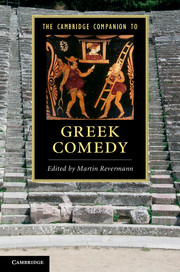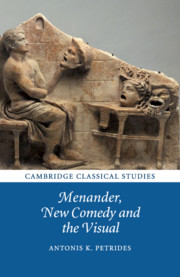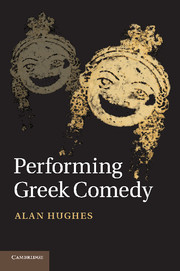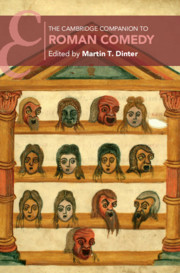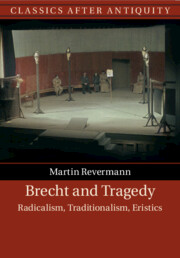The Cambridge Companion to Greek Comedy
Greek comedy flourished in the fifth and fourth centuries BC, both in and beyond Athens. Aristophanes and Menander are the best-known writers whose work is in part extant, but many other dramatists are known from surviving fragments of their plays. This sophisticated but accessible introduction explores the genre as a whole, integrating literary questions (such as characterisation, dramatic technique or diction) with contextual ones (for example audience response, festival context, interface with ritual or political frames). In addition, it also discusses relevant historical issues (political, socio-economic and legal) as well as the artistic and archaeological evidence. The result provides a unique panorama of this challenging area of Greek literature which will be of help to students at all levels and from a variety of disciplines but will also provide stimulus for further research.
- Explores Greek comedy as a continuum, presenting a more holistic understanding of the field
- Includes a broad range of perspectives: philological, socio-historical, linguistic, theatrical and performative, iconographic and reception-oriented
- Covers areas that are rarely confronted head-on in scholarly literature
Reviews & endorsements
"As with all the volumes in this series, there are notes on further reading to each chapter, an extensive bibliography and a comprehensive index. The volume is intended for students at all levels and in various disciplines, by no means only classicists, and for specialists and researchers in various fields. It is the most up-to-date and comprehensive survey of a field of study significant in many ways beyond the purely literary and theatrical."
Stuart James, Reference Reviews
'The Cambridge Companion to Greek Comedy achieves success by combining consistent excellence on the part of the contributors with a well-conceived and well-executed editorial plan.' Greece and Rome
'This Companion offers not just an introduction to comedy but a useful guide to the scholarship on comedy. … This volume is considerably more ambitious and authoritative than many so-called Companions. It immediately establishes itself as the standard work on Greek comedy, and it will be widely read and consulted by students and scholars alike. … It is one of the most interesting books on Greek drama to have appeared for many years, and it conveys a clearer sense of what komoidia was than any other introductory study of the genre.' Matthew Wright, Classical Review
'All in all, this is a superb companion: a comprehensive and rich collection that will serve as an invaluable resource for students and specialists alike. It is a work full of clever and challenging essays …' E. P. Moloney, Phoenix
Product details
May 2014Adobe eBook Reader
9781139989206
0 pages
0kg
24 b/w illus. 1 map 4 tables
This ISBN is for an eBook version which is distributed on our behalf by a third party.
Table of Contents
- Introduction Martin Revermann
- Part I. Setting the Stage (in Athens and Beyond):
- 1. Defining the genre David Konstan
- 2. The rivals of Aristophanes and Menander Zachary P. Biles
- 3. Fourth-century comedy before Menander Keith Sidwell
- 4. Epicharmus and early Sicilian comedy Kathryn Bosher
- 5. The iconography of comedy Eric Csapo
- Part II. Comic Theatre:
- 6. Dramatic technique and Athenian comedy C. W. Marshall
- 7. Character types Ian Ruffell
- 8. The language(s) of comedy Andreas Willi
- Part III. Central Themes:
- 9. Laughter Stephen Halliwell
- 10. Utopianism Ian Ruffell
- 11. The Greek 'comic hero' Ralph M. Rosen
- 12. Social class David Kawalko Roselli
- 13. Performing gender in Greek Old and New Comedy Helene Foley
- 14. Divinity and religious practice Martin Revermann
- Part IV. Politics, Law and Social History:
- 15. The politics of Greek comedy Alan Sommerstein
- 16. Comedy and Athenian festival culture Edith Hall
- 17. Comedy and Athenian law Victoria Wohl
- 18. Comedy and the social historian Susan Lape and Alfonso Moreno
- Part V. Reception:
- 19. Attic comedy in the rhetorical and moralising traditions Richard Hunter
- 20. Contexts of reception in antiquity Sebastiana Nervegna
- 21. The reception of Greek comedy in Rome Michael Fontaine
- 22. The transmission of comic texts Nigel Wilson
- 23. Snapshots of Aristophanes and Menander: from spontaneous reception to belated reception study Gonda Van Steen.

